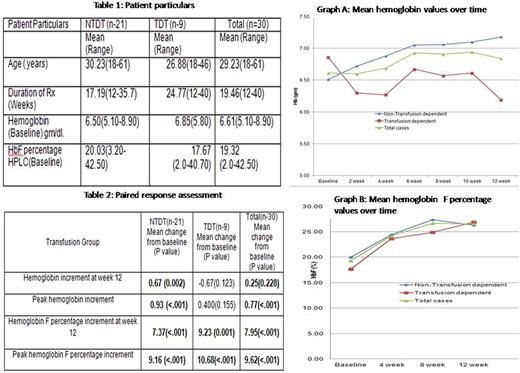Abstract
Introduction
Phenotypic severity of HbE-beta thalassemia depends on hemoglobin F Level. Gamma globin chain induction has the potential of increasing HbF and decreasing transfusion dependence, and disease severity. Decitabine as a hypomethylating agent can activate repressed gamma globin gene and lead to increase in hemoglobin F.
Objectives
To study effect of Decitabine on hemoglobin level, hemoglobin F and transfusion requirement as well as its adverse effects.
Materials and Methods
Thirty patients of HbE Beta thalassemia were enrolled. Both transfusion dependent (TDT) and non-transfusion dependent patients (NTDT) were included after obtaining informed consent. Inclusion criteria included - age greater than 18 years, free of transfusion for at least 90 days before entry (only for NTDT to get better idea of baseline hemoglobin), without any co-morbidity.Participants received 0.2 mg/kg of 5-aza-2′-deoxycytidine (decitabine) subcutaneously on two consecutive days a week for at least 12 weeks. Complete hemogram was done every two weeks and HPLC at every four week interval, till two months after last dose of drug. Patients were transfused packed red blood cells (PRBC) if symptomatic or if Hb < 5gm/dl.
Results
Thirty patients (21- NTDT and 9 - TDT), were included in this study. Study comprised of 16 males (53.3 percent) and 14 females (46.7 percent) with a mean age of 29.33 years (summarized in table 1). Hemoglobin increment of > 1gm/dl was seen in 7 (33.3 percent) and >0.5 gm/dl was seen in 8 (38.1 percent) patients of NTDT group. For NTDT group peak mean increment in hemoglobin was 0.938 gm/dl (p value <.001, 95 percent confidence interval 1.33 to 0.539). Detailed results and paired analysis given in table 2. Graph A and Graph B shows trends in hemoglobin and hemoglobin F percentage respectively.
Transfusion requirement decreased to 0.24 units compared to 0.96 units per patient per month for TDT patients over a period of last one year. Out of the nine transfusion dependent patients five (55 percent cases) became transfusion independent and continued to remain so during mean follow up period of 6 months (range: 4months to 10 months), three patients continued to remain transfusion independent even after discontinuation of therapy.
Decitabine was well tolerated, no hematological toxicity was documented. Regarding non-hematological toxicities, 1 patient complained of chest tightness (grade 1), 1 patient had malena (grade III), endoscopy of this patient showed gastric erosion, 3 patients developed respiratory tract infection (grade I/II- managed on day care basis), 1 patient complained of small joint pain (grade I).
Discussion
Various drugs like hydroxyurea, 5-azacytidine, decitabine, erythropoietin stimulating agents have been evaluated as hemoglobin F inducing agents. Hydroxyurea has shown beneficial effect in HbE Beta Thalassemia patients, with range of response being in between 1% and 90%, and averaging at 20% (Musallam KM et. al Blood 2013). The efficacy of agents such as hydroxyurea is compromised by the suppressive effects on bone marrow function. Hydroxyurea has mutagenic effect also. (Bradai M et al. Transfusion. 2007).Few studies noted a decline in hematological response beyond 12 months (Rigano P et al. BJH 2010). So an alternative is required.
Hypomethylating agents can cause activation of gamma globin gene and hence, use of decitabine can be a promising strategy. The only study done previously, showed increased total hemoglobin and absolute fetal hemoglobin. Treatment was well tolerated, with the main adverse event being an elevation in platelet counts (Oliviero NF et al. Blood 2011).
In the present study relatively larger number of patients were followed up for a longer period of time and included both TDT and NTDT group.Decitabine was found to increase both hemoglobin and hemoglobin F in NTDT group. In the TDT group it decreased transfusion requirement significantly with increase in hemoglobin F percentage.
Even though this study showed good response in HbE/ Beta thalassemia, a randomized control trial with hydroxyurea, with even longer duration of follow up needs to be done to compare both the drugs.
Conclusion
Decitabine is well tolerated, and is efficacious in increasing hemoglobin F percentage in HbE Beta thalassemia patients. There is decrease in transfusion requirement in TDT group. There is improvement in total hemoglobin as seen in NTDT group.
No relevant conflicts of interest to declare.
Author notes
Asterisk with author names denotes non-ASH members.


This feature is available to Subscribers Only
Sign In or Create an Account Close Modal